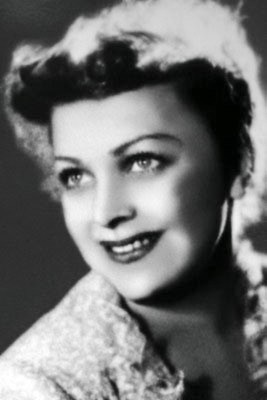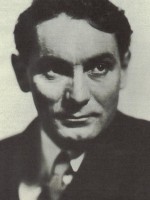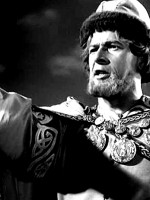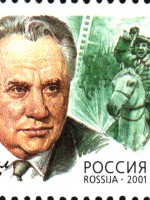Lyudmila Tselikovskaya est une Actrice née le 8 septembre 1919 à Astrakhan (Russie)

Lyudmila Vasilyevna Tselikovskaya (Russian: Людмила Васильевна Целиковская, 8 September 1919 – 4 July 1992) was a Russian film and theatre actress. Immensely popular in the 1940s due to parts in films like Hearts of the Four (1941-1944), Anton Ivanovich Gets Angry (1941), The Aerial Cabman (1943), Ivan the Terrible (1943), Twins (1945) and The Busy Estate (1946), she had a troubled artistic career and received her People's Artist of the RSFSR title only in 1963. For 15 years Tselikovskaya was a partner of Yuri Lyubimov, which never made her life easier, not in the Vakhtangov Theatre, with an orthodox Communist Mikhail Ulyanov at the helm. Tselikovskaya got little by way of laurels from the Soviet officialdom (and has been notoriously denied the People's Artist of the USSR title, a token of the ideological approval) but was admired by general public as a true legend of the Soviet War time cinema.
In 1938 Tselikovskaya debuted on the big screen as a Young Pioneer leader Valya in Young Captains. Film director Konstantin Yudin noticed the young actress and invited her to join the cast of his Hearts of the Four comedy, where she played Shura Murashova. As the War broke out, the film had to be shelved. Released in 1945, it had great success, landing at No.5 in that year's Soviet box-office charts. Mass popularity, though, came to her two years earlier, with The Aerial Cabman, the film the script of which Valentin Katayev has written exceptionally for her. While shooting the film, Tselikovskaya fell in love with fellow actor Mikhail Zharov. In 1943, now husband and wife, the pair spent several months at the frontline, performing before Soviet soldiers and officers of the General Gromov's 3rd Air Army to the great delight of the fighters who admired the tandem and the film they starred in.
After the Aerial Cabman’s premiere Tselikovskaya joined the cast of Sergei Eisenstein's historical epic Ivan the Terrible where she played Tsarina Anastasiya, the part initially intended for Galina Ulanova. All the film's leading actors were awarded with the Stalin Prize, with Tselikovskaya as an exception. "The unlikeliest Tsarina", Stalin reportedly pronounced, while crossing her name out. The film brought Tselikovskaya nothing but trouble: she seriously damaged her eyes' crystalline lenses during one session and temporarily lost her job at the Vakhtangov Theatre where they've lost all patience with an ever absent actress. "I have never been supported by the government. Besides, Alexandrov's comedies were getting all the praise, while Konstantin Yudin's films were always criticized - such was the tendency for some reason. I've always felt that for our political leadership I was a second-rate actress. But common people loved me, and that was giving me strength", Tselikovskaya later stated.
After the War Tselikovskaya appeared in Konstantin Yudin's Twins (1945) and The Busy Estate which Zharov wrote and directed specifically for his wife. The War-time romantic comedy in which Tselikovskaya played corporal Tonya, pestered by suitors, all of them heroic pilots, was a star-studded affair (with Zharov as sergeant major Semibaba and Sergey Filippov a German spy) but received cold shoulder from critics who accused its makers of 'bad taste pandering' and 'the lack of progressive ideas'. Nevertheless it became No.7 most popular film of 1946 in the USSR.
Zinochka, a sister of mercy in Aleksandr Stolper's adaptation of Boris Polevoy's The Tale of a Proper Man (1948), could have marked a turning point in Tselikovskaya's career in film, but her strong dramatic performance wasn't noticed by the Soviet directors. They were willing only to exploit her naive ingénue image, the actress was rejecting one script after another and as a result for 9 years had no roles at all. Her most significant theatre works of this period were Denise de Flavigny (Mam'zelle Nitouche), Tsarina Maria Nagaya (The Great Tsar, Vladimir Solovyov's play) and Geneura (Deep Roots, by James Gow and Arnaud d'Usseau).
In the late 1940s Tselikovskaya found herself in deep personal trouble. Her fourth husband, a successful Soviet architect Karo Alabyan (whom she married in 1948, after divorcing Zharov), suddenly fell out of favour with Lavrenty Beria and lost his job and his home too, so until 1953 the couple had to live at their friends and relatives'. Tselikovskaya best-known film of the 1950s was Samson Samsonov's The Cricket (after Anton Chekhov's short story "Poprygunya") in which she was cast as Olga, Dymov's wife. In 1955 at the Venice Film Festival it was voted the Best Foreign Film and received the Silver Lion award. Alabyan's death in 1959 marked the beginning of another lean period for Tselikovskaya, which, despite her getting the People's Artist of the RSFSR title in 1963, ended only with her death.
In the early 1960s she became the partner of theatre director Yuri Lyubimov. "I know for sure that it was due to this liaison that she's been denied the People's Artist of the USSR title. The Theatre several times came out with the suggestion, but in the higher spheres the fact that she was Lyubimov's civil wife was enough to warrant a rejection," Tselikovskaya's son, Aleksandr Alabyan, said later. After Mikhail Ulyanov became the Vakhtangov Theatre's director, the actress stopped getting roles at all, for the very same reason of being a semi-wife of a semi-dissident. One of her last film roles was that of Raisa Gurmyzhskaya in the adaptation of Alexander Ostrovsky's The Forest. On 6 July 1992, Tselikovskaya died of cancer. She was buried at the Novodevichye Cemetery, next to Karo Alabyan's grave.
Source : Wikidata
Lyudmila Tselikovskaya

Nom de naissance Lyudmila Vasilyevna Tselikovskaya
Naissance 8 septembre 1919 à Astrakhan (Russie)
Mort 4 juillet 1992 (à 72 ans) à Moscou (Russie)
Naissance 8 septembre 1919 à Astrakhan (Russie)
Mort 4 juillet 1992 (à 72 ans) à Moscou (Russie)
Biographie
Lyudmila Vasilyevna Tselikovskaya was born in a musical family. Her father, a theatre musical producer, later went to conduct the Bolshoy Theatre orchestra. Her mother, and opera singer, also performed in the Bolshoy in the late 1920s. In 1925 the family moved from Astrakhan to Moscow where the girl, who had the perfect pitch, joined the piano class of the prestigious Gnesins Musical school. Despite her parents' resistance, she preferred to embark upon the career of an actress and in 1937 enrolled into the Shchukin Theatre Institute. While still a student, she joined the staff of the Moscow Vakhtangov Theatre, making her debut on stage as Clarice in Servant of Two Masters by Carlo Goldoni.In 1938 Tselikovskaya debuted on the big screen as a Young Pioneer leader Valya in Young Captains. Film director Konstantin Yudin noticed the young actress and invited her to join the cast of his Hearts of the Four comedy, where she played Shura Murashova. As the War broke out, the film had to be shelved. Released in 1945, it had great success, landing at No.5 in that year's Soviet box-office charts. Mass popularity, though, came to her two years earlier, with The Aerial Cabman, the film the script of which Valentin Katayev has written exceptionally for her. While shooting the film, Tselikovskaya fell in love with fellow actor Mikhail Zharov. In 1943, now husband and wife, the pair spent several months at the frontline, performing before Soviet soldiers and officers of the General Gromov's 3rd Air Army to the great delight of the fighters who admired the tandem and the film they starred in.
After the Aerial Cabman’s premiere Tselikovskaya joined the cast of Sergei Eisenstein's historical epic Ivan the Terrible where she played Tsarina Anastasiya, the part initially intended for Galina Ulanova. All the film's leading actors were awarded with the Stalin Prize, with Tselikovskaya as an exception. "The unlikeliest Tsarina", Stalin reportedly pronounced, while crossing her name out. The film brought Tselikovskaya nothing but trouble: she seriously damaged her eyes' crystalline lenses during one session and temporarily lost her job at the Vakhtangov Theatre where they've lost all patience with an ever absent actress. "I have never been supported by the government. Besides, Alexandrov's comedies were getting all the praise, while Konstantin Yudin's films were always criticized - such was the tendency for some reason. I've always felt that for our political leadership I was a second-rate actress. But common people loved me, and that was giving me strength", Tselikovskaya later stated.
After the War Tselikovskaya appeared in Konstantin Yudin's Twins (1945) and The Busy Estate which Zharov wrote and directed specifically for his wife. The War-time romantic comedy in which Tselikovskaya played corporal Tonya, pestered by suitors, all of them heroic pilots, was a star-studded affair (with Zharov as sergeant major Semibaba and Sergey Filippov a German spy) but received cold shoulder from critics who accused its makers of 'bad taste pandering' and 'the lack of progressive ideas'. Nevertheless it became No.7 most popular film of 1946 in the USSR.
Zinochka, a sister of mercy in Aleksandr Stolper's adaptation of Boris Polevoy's The Tale of a Proper Man (1948), could have marked a turning point in Tselikovskaya's career in film, but her strong dramatic performance wasn't noticed by the Soviet directors. They were willing only to exploit her naive ingénue image, the actress was rejecting one script after another and as a result for 9 years had no roles at all. Her most significant theatre works of this period were Denise de Flavigny (Mam'zelle Nitouche), Tsarina Maria Nagaya (The Great Tsar, Vladimir Solovyov's play) and Geneura (Deep Roots, by James Gow and Arnaud d'Usseau).
In the late 1940s Tselikovskaya found herself in deep personal trouble. Her fourth husband, a successful Soviet architect Karo Alabyan (whom she married in 1948, after divorcing Zharov), suddenly fell out of favour with Lavrenty Beria and lost his job and his home too, so until 1953 the couple had to live at their friends and relatives'. Tselikovskaya best-known film of the 1950s was Samson Samsonov's The Cricket (after Anton Chekhov's short story "Poprygunya") in which she was cast as Olga, Dymov's wife. In 1955 at the Venice Film Festival it was voted the Best Foreign Film and received the Silver Lion award. Alabyan's death in 1959 marked the beginning of another lean period for Tselikovskaya, which, despite her getting the People's Artist of the RSFSR title in 1963, ended only with her death.
In the early 1960s she became the partner of theatre director Yuri Lyubimov. "I know for sure that it was due to this liaison that she's been denied the People's Artist of the USSR title. The Theatre several times came out with the suggestion, but in the higher spheres the fact that she was Lyubimov's civil wife was enough to warrant a rejection," Tselikovskaya's son, Aleksandr Alabyan, said later. After Mikhail Ulyanov became the Vakhtangov Theatre's director, the actress stopped getting roles at all, for the very same reason of being a semi-wife of a semi-dissident. One of her last film roles was that of Raisa Gurmyzhskaya in the adaptation of Alexander Ostrovsky's The Forest. On 6 July 1992, Tselikovskaya died of cancer. She was buried at the Novodevichye Cemetery, next to Karo Alabyan's grave.
Le plus souvent avec
Filmographie de Lyudmila Tselikovskaya (1 films)
Actrice

Ivan le Terrible (1945)
, 1h43Réalisé par Sergueï Eisenstein
Origine Russie
Genres Drame, Biographie, Historique
Thèmes Politique, Royauté
Acteurs Nikolai Cherkasov, Lyudmila Tselikovskaya, Pavel Kadotchnikov, Mikhail Zharov, Andrei Abrikosov, Vsevolod Poudovkine
Note77%





Devant l'incapacité des régents, le jeune Ivan décide de se faire couronner. Mais sa tante, qui voudrait voir son fils Vladimir sur le trône, avec la complicité des boyards, fait empoisonner la tsarine. Ivan se retire alors dans un monastère. Le peuple rappelle Ivan.
 Connexion
Connexion




